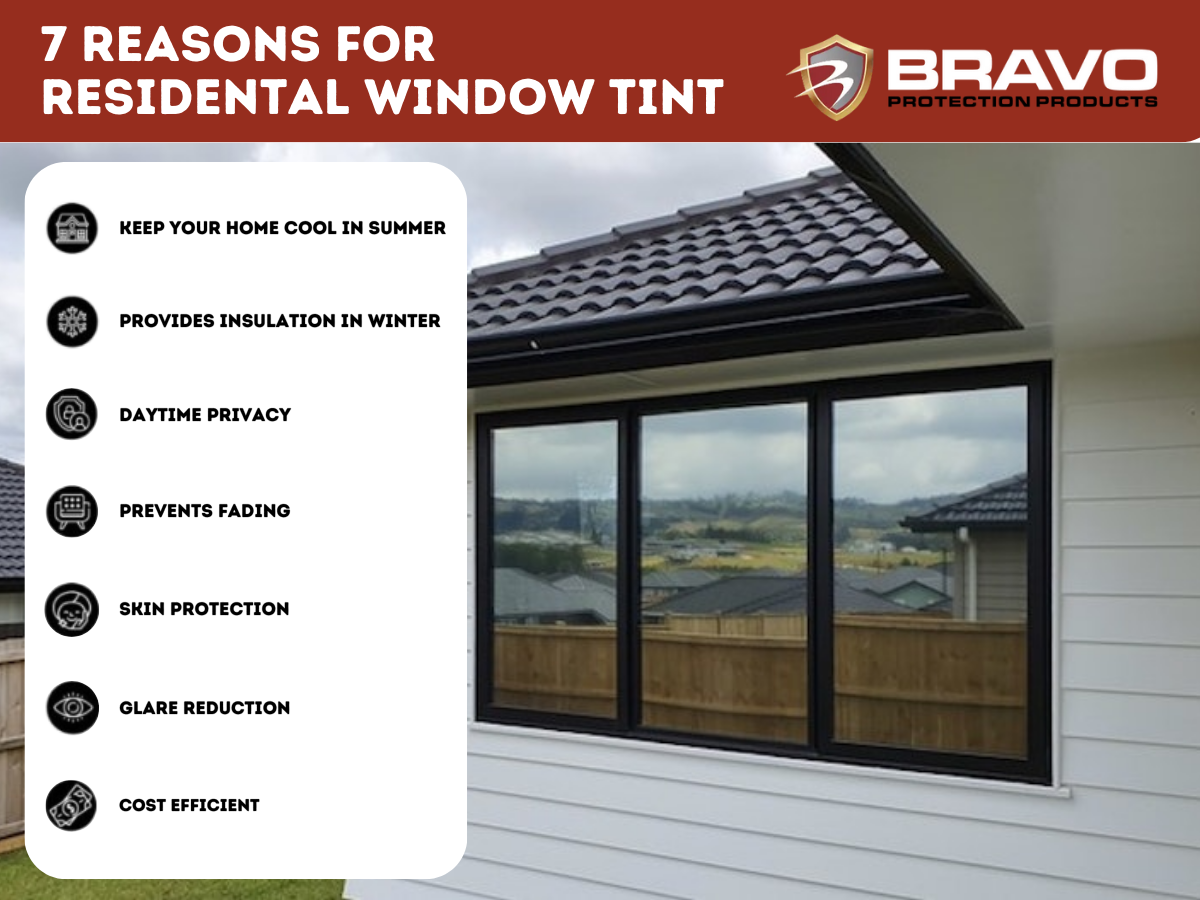Why Residential Window Tint is Perfect for Office and Research Studies
Why Residential Window Tint is Perfect for Office and Research Studies
Blog Article
Exactly How Residential Home Window Tinting Enhances Your Home's Power Effectiveness
Residential window tinting provides a compelling option for property owners looking for to enhance power effectiveness within their home. By applying specialized movies to windows, it properly decreases warmth transfer, thus maintaining indoor temperature levels and minimizing the requirement for too much heating or air conditioning. This not just reduces power consumption however additionally offers an extra comfortable atmosphere by minimizing glare. Recognizing the nuances of exactly how tinting jobs and picking the suitable type for your home can be essential. Curiously, what elements should one think about prior to making this financial investment?
Understanding Window Tinting
Understanding window tinting is important for house owners looking for to improve both comfort and energy effectiveness in their space. Residential Window Tint. Window tinting includes the application of a thin film to the interior or outside surface area of glass home windows. This movie can substantially regulate the amount of sunlight and heat that enters a home, thus affecting interior environment conditions
There are different types of home window tinting movies offered, each with distinct homes. The efficiency of window tinting is commonly measured by its Visible Light Transmission (VLT) percentage, which shows exactly how much light can pass through the movie.
Benefits of Power Efficiency
Home window tinting not just improves appearances however additionally plays a considerable role in enhancing energy efficiency within household areas. By lowering warm transfer via windows, colored movies produce an extra stable interior environment, which can cause substantial reductions in power intake for heating & cooling. This energy effectiveness converts into lower energy bills, supplying homeowners with considerable lasting savings.

Furthermore, window tinting boosts the convenience of living areas. By lessening glow and blocking damaging UV rays, colored home windows create a more enjoyable environment, which can lead to improved health for passengers. The protection against UV rays also aids maintain furnishings and flooring from fading, contributing to the long life of family items.
Just How Tinting Works
Tinting movies operate via a mix of sophisticated materials and modern technologies developed to regulate the amount of solar power entering a home. Mostly composed of polyester, these movies frequently include metallic or ceramic particles that show and absorb heat. This twin capability enables them to significantly minimize the infiltration of ultraviolet (UV) rays and infrared radiation while permitting noticeable light to pass through.
The efficiency of home window tinting is measured by its solar warm gain coefficient (SHGC), which shows just how much solar energy is sent via the window. Reduced SHGC worths are more suitable as they signify better heat being rejected. In addition, window tints can feature a selection of shades, allowing house owners to tailor their aesthetic preferences while improving power performance.
Furthermore, these films serve as an obstacle, stopping warmth loss throughout colder months by reflecting interior warmth look at here now back into the home. This thermal insulation impact matches the air conditioning advantages obtained throughout warmer months, adding to a balanced indoor climate year-round. By managing solar energy efficiently, domestic home window tinting not just improves convenience yet also plays an important function in decreasing energy usage and reducing utility bills.
Choosing the Right Color

There are different kinds of window films readily available, including dyed, metalized, and ceramic. Colored movies are cost-effective however might have limited sturdiness. Metalized movies offer much better warmth denial but can hinder digital signals. Ceramic movies provide outstanding warm control without endangering visibility and are highly long lasting, making them a preferred selection.
Noticeable light transmission (VLT) is look here another essential element, as it suggests the amount of natural light that can travel through the tinted glass. House owners must choose a color with a VLT that matches their illumination preferences while still offering sufficient glare reduction.
Additionally, analyzing the solar warmth gain coefficient (SHGC) can aid establish how well a tint can block warm from sunlight. A lower SHGC shows far better warmth control, inevitably boosting energy effectiveness.
Installation and Maintenance Tips
Appropriate installation and upkeep are vital elements in taking full advantage of the advantages of domestic window tinting. Experts additionally make use of specialized strategies and devices, which can enhance the toughness and efficiency of the color.
Complying with installation, upkeep is essential to extend the life of the window movie. It is recommended to wait at the very least 30 days prior to cleaning up the tinted home windows to enable the sticky to treat completely.
Resolving these concerns without delay can protect against more damage and preserve energy performance. By sticking to these installation and maintenance pointers, home owners can ensure their window tinting proceeds to give substantial power savings and comfort for years to come.
Final Thought
In final thought, household window tinting serves as an efficient option for enhancing power performance within homes. By lowering warmth transfer and obstructing hazardous UV rays, home window films add to decrease energy consumption and enhanced interior comfort.
Home window tinting involves the application of a slim film to the inside or outside surface area of glass windows. By reducing continue reading this heat transfer through home windows, colored movies produce a more stable interior environment, which can lead to substantial reductions in power consumption for heating and cooling.The effectiveness of window tinting is gauged by its solar heat gain coefficient (SHGC), which indicates just how much solar energy is sent with the window. By managing solar energy efficiently, property home window tinting not only boosts comfort however additionally plays a crucial duty in decreasing power consumption and decreasing utility costs.
By reducing warmth transfer and blocking hazardous UV rays, home window films add to reduce energy intake and improved indoor comfort.
Report this page